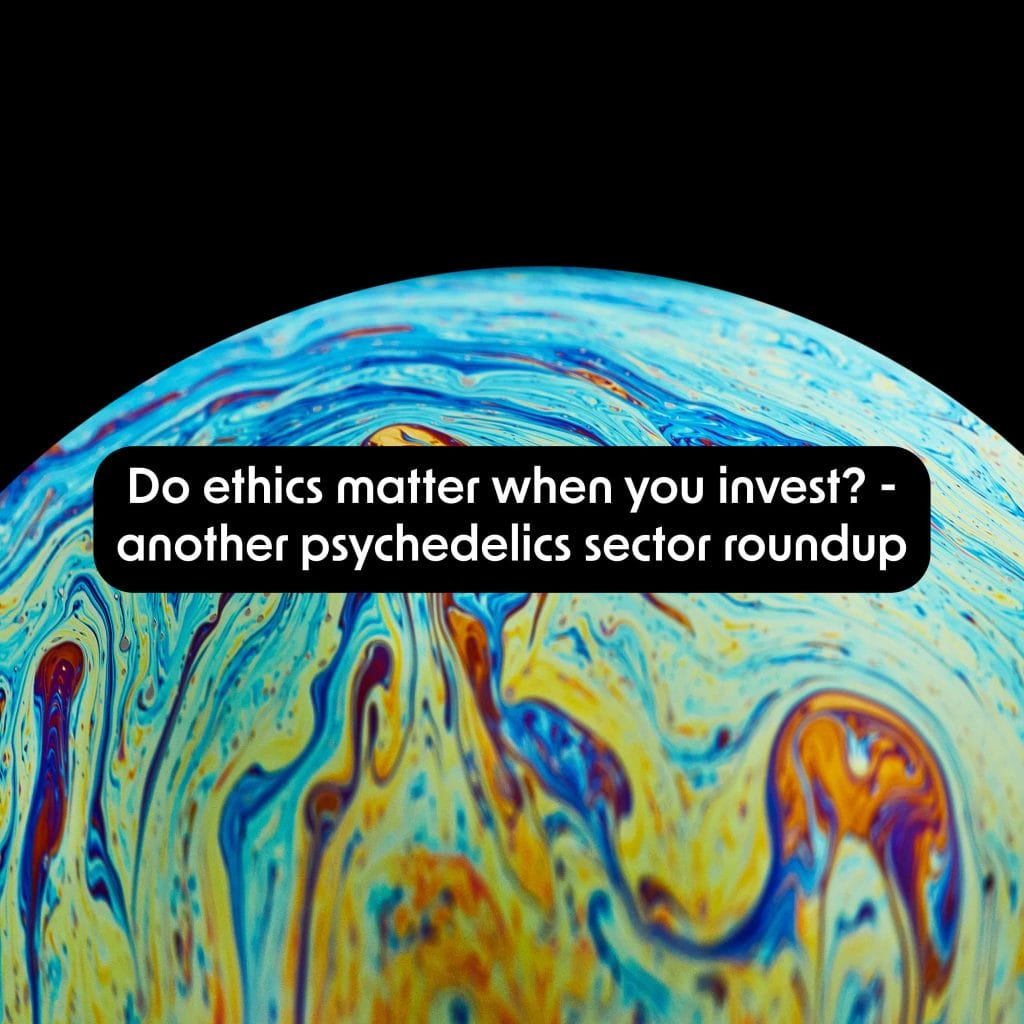Environmental, Social and Governance (ESG) focused investment is a relatively new accepted method for socially conscious investors to allocate their investment capital in public/private companies that align with their ideals.
I had a conversation the other day where I was told basically to leave my integrity at the door when making an investment. The argument was made that since I didn’t feel like becoming involved in the betting/gaming industry, I was effectively a hypocrite because stock market investment was, at its core, an act of gambling.

To address the latter, according to a recent paper published through the US National Library of Medicine National Institutes of Health, researchers examined the conceptual relationship between gambling, investing and speculation.
The introduction to this report eloquently stated:
“Although financial market activity and gambling both entail financial risk, most people tend to regard these things as fundamentally different. The purchase of guaranteed investment certificates (GICs), government or corporate bonds, and company shares (stocks) are often thought of as “investments,” with the term investment having connotations of low risk, positive expected returns, influenced by skill and knowledge, and a wise thing to engage in. In contrast, gambling has connotations of being high risk, with negative expected returns, influenced primarily by chance, potentially addictive and/or financially ruinous, and involving a completely different set of activities…”
Meaning, continuous gambling such as slot machines and casino games where chance outstrips skill, the high frequency of activity/betting reduces the player’s ability to come out ahead to almost zero. However, even though traditional investment in public markets involve long-term, skill-based, low-risk transactions, the markets of late have for the most part devolved into a casino-like atmosphere.
The roulette games of stock investment include day-trading/high-frequency trading, penny stocks, shorting and derivatives. These most-times reckless activities popularized by entities such as Robinhood and Wall Street Bets, incite YOLO plays by inexperienced investors which result in catastrophic options-based portfolio losses.
This indeed is gambling in its worst form. As previously stated, it’s addictive, lacks evidence-based tactics and preys on the stupid.
One might say, “Buyer Beware”, but what responsibilities do issuers and institutional traders have to the retail investment community to ensure they are fairly traded and provide honest and transparent growth opportunities to shareholders and clients?
The CFA Institute, a globally recognized body that provides accreditation to investment professionals described the pros of an ethical market in its Standards of Practice Guidance, updated in October 2017:
“CFA Institute recently added the concept “for the ultimate benefit of society” to its mission. The premise is that we want to live in a socially, politically, and financially stable society that fosters individual well-being and welfare of the public. A key ingredient for this goal is global capital markets that facilitate the efficient allocation of resources so that the available capital finds its way to places where it most benefits that society. These investments are then used to produce goods and services, to fund innovation and jobs, and to promote improvements in standards of living. Indeed, such a function serves the interests of the society. Efficient capital markets, in turn, provide a host of benefits to those providing the investment capital. Investors are provided the opportunity to transfer and transform risk because the capital markets serve as an information exchange, create investment products, provide liquidity, and limit transaction costs.”
As discussed in the document, governments and regulatory bodies have done their best to create a standard for best practices for companies and investment professionals, but their efforts only deal with legal infractions. Public companies and investment firms are capable to act within the legislative framework given but can still operate outside of an ethical standard as ethics are a moral action to do what’s right, not just abide by the law.
These ethical standards are broken in many ways such as accruing valuation based on no viable justification, one of the highest profile offenders of this standard is EV manufacturer, Tesla.
Actions such as this in burgeoning markets like dot com, psychedelics, cannabis, 3D printing, etc., are progressively damaging as the CFA paper goes on to illustrate:
“…a well-functioning and efficient capital market system is dependent on trust of the participants. If investors believe that capital market participants—investment professionals and firms—cannot be trusted with their financial assets or that the capital markets are unfair such that only insiders can be successful, they will be unlikely to invest or, at the very least, will require a higher risk premium. Decreased investment capital can reduce innovation and job creation and hurt the economy and society as a whole. Reduced trust in capital markets can also result in a less vibrant, if not smaller, investment industry.”
So, what can you do as an investor?
The argument has been made that investment participation within a market or corporate entity allows said investor the opportunity to change things from the inside. A typical retail investor’s influence is severely limited to penny stock companies as no one except Carl Icahn and Berkshire Hathaway have the power to individually change billion-dollar corporations like Compass Pathways.
That said, are you obligated to take every opportunity that comes along in the market regardless of your personal credo? As the old, disturbingly violent saying goes, “there is more than one way to skin a cat.” Opportunities within the public market are many and with the required due diligence, smart investors can get involved in ventures they can really get behind.
Medical psychedelics is an interesting sector with huge potential for improving the human condition and our society. The industry remains in its nascent form and is subject to an evolving legislative landscape that may or may not come to commercial fruition in the next decade.
To de-risk your portfolio, it would be prudent to examine blue-chip dividend paying opportunities in the market before laying down your hard-earned dollars on a high growth penny stock. Never lay down more than you can afford to lose completely and take your profits when they increase 20%-25% beyond your initial investment. Use that money to re-invest or build a cash position.
Now that you’ve taken care of your portfolio, you may want to look at some psychedelic companies I’ve spent a lot of time talking about.
Filament Health (FH.NEO) is an interesting investment option as the company is working the natural psilocybin angle through the proprietary and patented extraction, purification and delivery of novel psilocybin compounds geared to provide a holistic entourage effect in psychedelics-assisted psychotherapy.
The path to legalization is long and complicated, but Filament manages differentiate itself in the small cap psychedelic market as been one of a select few Canadian companies to have GMP compliant psilocybin drug candidates entering Health Canada approved clinical trials.
The company recently announced that its wholly owned subsidiary, Psilo Scientific, has been added to Health Canada’s list of licensed psilocybin producers. When legislation regarding the medical use of psilocybin evolves beyond special exemption status, Filament Health will be well-positioned to commercialize its products and IP.
Filament Health currently trades at $0.15 per share for a market cap of $24.71 million.
I like MYND Life Sciences (MYND.C) because of its unique approach to psychedelics-assisted psychotherapy which is based on the concept of neuroinflammation and the growing evidence of it being the causative factor in many neurological conditions such as depression and Alzheimers.
The company carries out ground-breaking research at UBC’s internationally renowned Michael Smith Laboratories where they are working to identify novel non-psychedelic psilocybin compounds with therapeutic potential and fewer adverse effects. The company is also developing a bio-marker panel that will assist in the diagnosis and management of neuro-psychiatric conditions.
According to the MYND website, the company holds 38 licenses for the research into 38 different analogues of psilocybin to select which ones can effectively modulate the Human Mycogene.
MYND’s offering opens the world of psilocybin-assisted therapy for individuals who do not want or are incapable of tolerating the traditional psychedelic aspects of natural psilocybin. This allows them to service a sizable niche of the metal health treatment demographic.
The company currently trades at $0.15 per share for a market cap of $6.89 million.
MindCure Health (MCUR.C) is financially focused while serving unique and necessary societal needs. The company is working to develop a synthetic ibogaine compound meant to guarantee clinical-grade effectiveness and dosage accuracy. This approach will also allow the company to do commercial production of ibogaine solutions without depriving traditional ritual users of natural plant availability.
The company has also launched an effort to treat Hypoactive Female Sexual Desire Disorder (HSDD) which affects an estimated 9.5 million pre-menopausal women in the U.S. alone. The project combines the use of MDMA with psychotherapy treatments.
MineCure released its quarterly financials on January 25, 2022, for Q2 2022. As I expected, company CEO, Kelsey Ramsden, kept true to her “cash is king” philosophy and operated the company’s treasury with an admirable frugality.
The company reported it still had over $13.0 million in the till to execute on its aims to commercialize its leading-edge digital technology therapy platform iSTRYM during 2022. This technological offering is therapy agnostic and assists both therapist and patient through the on-boarding and recovery process.
Having this at the forefront of MindCure’s efforts enables the company to potentially realize significant near-term revenues ahead of any possible legalization of psychedelic-assisted psychotherapies. It also puts them in front when that legislation is passed as they would already have a presence in the very clinic/treatment centres they intend to market their psychedelics-assisted treatments to.
MindCure currently trades at $0.17 per share for a market cap of $15.45 million. Remember they have $13.0 in cash still.
There are more small caps I could mention, so please suggest some of your favorites so I can cover them. I am not addressing any large cap psychedelics companies as they are mostly already beyond their worth in valuation and wouldn’t necessarily provide a great opportunity for investors.
Yes, these are small cap ventures and have a higher risk profile because of it, but as I said earlier, a de-risked portfolio not maxed out on options trading allows for this type of investment if one is conservative with their investment capital.
So, do ethics have a place in the public market? Absolutely. They are the only things that will ensure a continued opportunity for yield when other financial institutions such as banks are choking on their respectively deregulated lunches. Please do your due diligence and speak with an investment professional before making any changes to your portfolio. Go ahead, pick your winners with good conscience, and make this a better planet. Good luck to all!
–Gaalen Engen
Full disclosure: Filament Health is an Equity.Guru marketing client.







